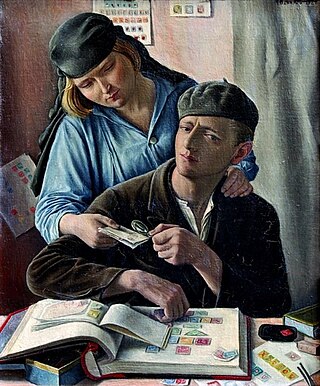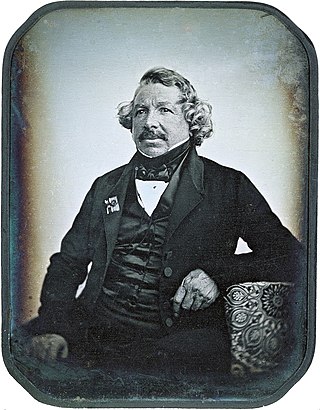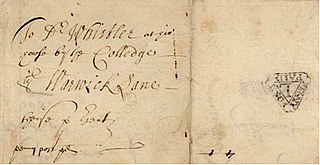Related Research Articles

A photograph is an image created by light falling on a photosensitive surface, usually photographic film or an electronic image sensor, such as a CCD or a CMOS chip. Most photographs are now created using a smartphone/camera, which uses a lens to focus the scene's visible wavelengths of light into a reproduction of what the human eye would see. The process and practice of creating such images is called photography.

Stamp collecting is the collecting of postage stamps and related objects. It is an area of philately, which is the study of stamps. It has been one of the world's most popular hobbies since the late nineteenth century with the rapid growth of the postal service, as a never-ending stream of new stamps was produced by countries that sought to advertise their distinctiveness through their stamps.

Daguerreotype was the first publicly available photographic process; it was widely used during the 1840s and 1850s. "Daguerreotype" also refers to an image created through this process.

The Autochrome Lumière was an early color photography process patented in 1903 by the Lumière brothers in France and first marketed in 1907. Autochrome was an additive color "mosaic screen plate" process. It was the principal color photography process in use before the advent of subtractive color film in the mid-1930s.

A vehicle registration plate, also known as a number plate, license plate, or licence plate, is a metal or plastic plate attached to a motor vehicle or trailer for official identification purposes. All countries require registration plates for road vehicles such as cars, trucks, and motorcycles. Whether they are required for other vehicles, such as bicycles, boats, or tractors, may vary by jurisdiction. The registration identifier is a numeric or alphanumeric ID that uniquely identifies the vehicle or vehicle owner within the issuing region's vehicle register. In some countries, the identifier is unique within the entire country, while in others it is unique within a state or province. Whether the identifier is associated with a vehicle or a person also varies by issuing agency. There are also electronic license plates.

The Crown Jewels of the United Kingdom, originally the Crown Jewels of England, are a collection of royal ceremonial objects kept in the Tower of London which include the coronation regalia and vestments worn by British monarchs.
Dinky Toys was the brand name for a range of die-cast zamak zinc alloy scale model vehicles produced by British toy company Meccano Ltd. They were made in England from 1934 to 1979, at a factory in Binns Road in Liverpool.

A letter box, letterbox, letter plate, letter hole, mail slot or mailbox is a receptacle for receiving incoming mail at a private residence or business. For outgoing mail, Post boxes are often used for depositing the mail for collection, although some letter boxes are also capable of holding outgoing mail for a carrier to pick up. Letterboxes or mailboxes use the following primary designs:

In electrical wiring, a light switch is a switch most commonly used to operate electric lights, permanently connected equipment, or electrical outlets. Portable lamps such as table lamps may have a light switch mounted on the socket, base, or in-line with the cord. Manually operated on/off switches may be substituted by dimmer switches that allow controlling the brightness of lamps as well as turning them on or off, time-controlled switches, occupancy-sensing switches, and remotely controlled switches and dimmers. Light switches are also found in flashlights, vehicles, and other devices.

A baseball field, also called a ball field or baseball diamond, is the field upon which the game of baseball is played. The term can also be used as a metonym for a baseball park. The term sandlot is sometimes used, although this usually refers to less organized venues for activities like sandlot ball.

A post box, also known as a collection box, mailbox, letter box or drop box is a physical box into which members of the public can deposit outgoing mail intended for collection by the agents of a country's postal service. The term post box can also refer to a private letter box for incoming mail.

A pillar box is a type of free-standing post box. They are found in the United Kingdom and British overseas territories, and, less commonly, in many members of the Commonwealth of Nations such as Cyprus, India, Gibraltar, Hong Kong, Malta, New Zealand and Sri Lanka, as well as in the Republic of Ireland. Pillar boxes were provided in territories administered by the United Kingdom, such as Mandatory Palestine, and territories with agency postal services provided by the British Post Office such as Bahrain, Dubai, Kuwait and Morocco. The United Kingdom also exported pillar boxes to countries that ran their own postal services, such as Argentina, Portugal and Uruguay.

Wall boxes are a type of post box or letter box found in many countries including France, the United Kingdom, the Commonwealth of Nations, Crown dependencies and Ireland. They differ from pillar boxes in that, instead of being a free-standing structure, they are generally set into a wall or supported on a free-standing pole, girder or other stable structure.

Lamp boxes are the smallest of the post boxes used by the Royal Mail in the UK, by its counterparts in the Commonwealth of Nations and also by An Post in Ireland. Their name derives from the fact that they were designed to be affixed to lamp posts, although they may equally be found embedded in walls or mounted on poles.

Automatic number-plate recognition is a technology that uses optical character recognition on images to read vehicle registration plates to create vehicle location data. It can use existing closed-circuit television, road-rule enforcement cameras, or cameras specifically designed for the task. ANPR is used by police forces around the world for law enforcement purposes, including to check if a vehicle is registered or licensed. It is also used for electronic toll collection on pay-per-use roads and as a method of cataloguing the movements of traffic, for example by highways agencies.

In modern heraldry, a royal cypher is a monogram or monogram-like device of a country's reigning sovereign, typically consisting of the initials of the monarch's name and title, sometimes interwoven and often surmounted by a crown. Such a cypher as used by an emperor or empress is called an imperial cypher. In the system used by various Commonwealth realms, the title is abbreviated as 'R' for 'rex' or 'regina'. Previously, 'I' stood for 'imperator' or 'imperatrix' of the Indian Empire.

In the UK, a Ludlow wall box is a post box where mail is deposited to be collected by the Royal Mail. They are built into stone pillars or the walls of buildings and are never found free-standing. This is because they are made largely from wood. They were nearly all made by the now-defunct company of James Ludlow & Son of Birmingham, whose name they take. Similar designs exist as historical artefacts in certain Commonwealth countries. Ludlow style boxes have been in use since 1885 and were in continuous manufacture until 1965.
The Board of Inland Revenue Stamping Department Archive in the British Library contains artefacts from 1710 onwards, and has come into existence through amendments in United Kingdom legislation.

The Fletcher Collection is Hugh Greenwell Fletcher's lifetime philatelic collection of British postage stamps and British stamps used abroad including overprints and non-stamp items such as postal stationery. On his death in 1968, the collection was bequeathed to the Bruce Castle Museum in Tottenham, once the home of Sir Rowland Hill. The collection was donated to the British Library in 1989.

The conservation and restoration of photographic plates is the process of caring for and maintaining photographic plates in order to preserve their materials and content. It covers the necessary measures that can be taken by conservators, curators, collection managers, and other professionals to conserve the material unique to photographic plate processes. This practice includes understanding the composition and agents of deterioration of photographic plates, as well as the preventive conservation and interventive conservation measures that can be taken to increase their longevity.
References
The Letter Box, Jean Young Farrugia, Centaur Press, 1969